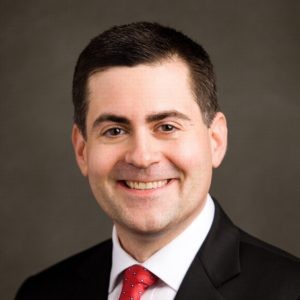The Georgia pastor narrowly defeated in his bid to become president of the Southern Baptist Convention this summer has filed a defamation lawsuit against the former denominational employee he believes purposely tanked his candidacy.
Mike Stone, pastor of Emmanuel Baptist Church in Blackshear, Ga., filed suit in federal court Oct. 18 against Russell Moore, former head of the SBC’s Ethics and Religious Liberty Commission. Stone accuses Moore of three violations: defamation by libel, false light invasion of privacy, and intentional infliction of emotional distress.

Russell Moore
He seeks $750,000 in damages, some of which would be to recoup the honorariums Stone will not receive by speaking in other churches since he is not SBC president and has been cast in a negative light by Moore’s actions, the suit says. “Honorariums” are payments made to guest preachers and speakers when they appear at churches other than their own. These payments typically range from token amounts to hundreds of dollars per appearance.
The suit explains: “Plaintiff’s income is derived from his services as a trusted minister in local church contexts, including, but not limited to, honorariums plaintiff receives as a guest speaker at religious services and conferences, almost exclusively among Southern Baptists.”
By his own description, Stone is not a megachurch pastor. His small-town Georgia congregation draws about 1,000 people on Sunday mornings. However, his leadership roles with the SBC and the Georgia Baptist Convention have made him well-known regionally.
Can Stone prove the charges?
Stone’s lawsuit claims that in February 2020 Moore “began a malicious, intentional and egregious campaign to harm (Stone), including, but not limited to, defaming him within the text of two letters strategically concealed from general distribution within the ERLC and the SBC but then subsequently surreptitiously released, or ‘leaked,’ to the news media which defendant knew … would result in their widespread publication.”

Ronnie Floyd and Mike Stone
Proving libel claims — in this case, defamation of character by libel — often is difficult because the standard of proof is high in the United States in order to protect freedom of speech. “Truth” is the gold standard defense against libel claims, because something cannot be defamatory if it is true. Beyond that, libelous statements must have been published and must have caused injury to the person suing.
However, a “false light” claims speaks to statements that may not be totally false but are at least intentionally misleading — statements made with either “negligence” or “actual malice” (depending upon whether one is a public figure) and that would be embarrassing or offensive to reasonable persons.
Stone has two other hurdles to cross before his case ever reaches a jury trial, as he has requested: The first is that courts often are reluctant to get involved in the internal workings of religious bodies because of the First Amendment protections regarding religious liberty. The second is to prove he is not a public figure, which would lower the standard for defamation from “actual malice” to “negligence” in speech.

J. Frank Norris
Examples of Southern Baptist ministers suing other ministers in civil court are exceptionally rare. One of the most notable such cases in American history involved the firebrand fundamentalist preacher J. Frank Norris of Fort Worth, Texas, who was found guilty of defaming another pastor, R.E. White. The court judgment against Norris in that 1941 case was $25,000 — which would be nearly half a million dollars in today’s economy.
What prompted this lawsuit?
Stone’s suit against Moore is rooted in the highly controversial and highly publicized debate within the SBC about reporting and rooting out sexual abuse.
At the June SBC annual meeting, the voting “messengers” sent from churches across the country not only narrowly rejected Stone’s presidential candidacy by about 500 votes but also rejected the plan of the SBC Executive Committee to investigate itself — and report back to itself — on claims that SBC leaders had mishandled or attempted to cover up allegations of sexual abuse in SBC churches and institutions.
Instead, messengers called for a completely independent investigation managed by a special task force. The fallout since that summer mandate has been significant, causing a dozen trustees of the Executive Committee to resign, as well as Executive Committee President Ronnie Floyd to resign abruptly with two weeks’ notice.
The Executive Committee is one of 12 SBC entities or persons named in a sweeping lawsuit filed by Hannah Kate Williams that alleges a conspiracy to cover up allegations of sexual abuse like she allegedly endured at the hands of her Baptist pastor-father.
‘Caring Well’ and Stone’s investigation of the ERLC
The bad blood between Stone and Moore goes back at least to fall 2019, when Moore and the ERLC sponsored a national conference on the subject of sexual abuse in churches. That “Caring Well” conference became a source of contention with Floyd, the Executive Committee president, and Stone, who at the time was serving in the elected role of Executive Committee chairman.
News of this rift became public in May 2021, during the runup to this year’s SBC annual meeting at which Stone was one of five candidates for the prestigious role of convention president. That’s when two letters written by Moore were leaked to the media by unknown sources.
The first letter had been written to Moore’s ERLC trustee executive committee explaining his views on why Stone, as SBC Executive Committee president, had launched an investigation of Moore and the ERLC. Stone not only created the task force but also appointed himself chairman of it.
Some of the concerns about Moore and the ERLC were vague, but others were specific, including the fact that Moore had denounced Donald Trump as morally unfit for the presidency while still endorsing the core tenets of the Republican Party.
The investigation was done under the banner of concern about declining gifts to the Cooperative Program unified budget, with accusations that Moore and the ERLC were taking positions unpopular with SBC churches that were, in turn, withholding or reducing their giving to the denomination. Some of the concerns about Moore and the ERLC were vague, but others were specific, including the fact that Moore had denounced Donald Trump as morally unfit for the presidency while still endorsing the core tenets of the Republican Party.
From Moore’s perspective, he was being investigated not because he was a never-Trumper but because he had become an outspoken advocate for victims of sexual abuse.
The nine-page letter was dated Feb. 24, 2020, one week after the Executive Committee had authorized the investigation of Moore and the ERLC. In it, Moore quickly singles out one person — Stone — as the driver of the investigation.
“The lazy journalistic assessment would be that this is about the president of the United States,” Moore wrote. “This has nothing to do with that. … Most Trump voters and supporters have been nothing but kind and encouraging to me.”
Instead, he wrote, “the presenting issue here is that, first and foremost, of sexual abuse. This Executive Committee, through their bylaws workgroup, ‘exonerated’ churches, in a spur-of-the-moment meeting, from serious charges of sexual abuse cover-up. One of those churches actively had on staff at the time a sex offender. J.D. Greear, our SBC president, and I were critical of this move, believing that it jeopardized not only the gospel witness of the SBC, but, more importantly, the lives of vulnerable children in Southern Baptist churches.”
‘Enraged’ Executive Committee leadership

Rachel Denhollander (right) talks with Russell Moore during the 2019 “Caring Well” conference. (ERLC photo by Karen Race)
At the October 2019 “Caring Well” conference, Moore interviewed victim advocate Rachael Denhollander, who told the story of her friend Jennifer Lyell, previously an executive at Lifeway Christian Resources, an SBC entity. Denhollander said Lyell made the hard decision to publicly disclose her story of being sexually abused by a former seminary professor in order to keep him from simply moving on to another ministry position to prey on others. Lyell alleged that story was then misrepresented in Baptist Press, which is part of the Executive Committee, and that Baptist Press took too longer to issue a correction that even then was not a correct description of her situation and painted her in a negative light.
In his letter, Moore explained that while interviewing Denhollander, “I refused to censor or stop anything that she had to say. In that conversation, she spoke about her thoughts about the disparagement and poor treatment of a sexual abuse survivor by Executive Committee staff. The story Rachael told is accurate, and Maria and I know that because we were, even during that very meeting, ministering alongside others to that mistreated young woman.”
Then he added this accusation: “This enraged some Executive Committee trustee leadership, who communicated that they were incensed that we would allow such a story to be told. That was communicated with special outrage since the Executive Committee had contributed some money to Caring Well as a reason why we should not have allowed this story to be told. I came away from these conversations with the distinct feeling that I was being told …, ‘You’ve got a nice little Commission there; would be a shame if something happened to it.’”
Moore’s allegations later were confirmed by leaked audio recordings — made by someone other than Moore —that appear to portray Stone and Floyd saying some of the things Moore accused them of saying, although supporters of Stone and Floyd quickly took to Twitter to say they saw no corroboration in the recordings.
Moore has contended that he became the victim of a slanderous misinformation campaign led by Stone and enabled by Floyd and others. Stone and Floyd denied all Moore’s allegations.
Abuse survivors defend Moore
But some sexual abuse survivors, including Lyell, have rallied to Moore’s defense and have begun telling their own stories of not being believed and of being mistreated by Executive Committee staff and trustees. They hope all these details will come out through the SBC’s new Sexual Abuse Task Force, which is due to report to the SBC annual meeting next June.

Jennifer Lyell
Lyell was among those responding with astonishment to news of Stone’s lawsuit against Moore. On Twitter Oct. 20, she wrote: “Mike Stone filing a lawsuit for libel, emotional distress, & invasion of privacy against Dr. Moore is egregious, ungodly, & completely without legal merit. I’m confident the court will regard it as such but am also ready with evidence to ensure the truth is fully known.”
If Stone’s case against Moore proceeds, its discovery phase no doubt will cover much of the same ground as the Sexual Abuse Task Force investigation — which now has additional firepower because of a controversial decision by Executive Committee trustees to waive attorney-client privilege for the investigation, meaning no records will be off-limits.
Blaming Russell Moore
Stone’s lawsuit picks up a curious train of thought that surfaced from other colleagues of his in September, as the SBC Executive Committee was locked in rancorous debate over whether to agree to a convention request to waive attorney-client privilege for the sexual abuse investigation.
On Sept. 17, Jonathan Whitehead, a layperson who serves on the board of the ERLC and was one of Moore’s detractors, wrote a 12-page letter to the Sexual Abuse Task Force claiming the task force should investigate the ERLC and Moore for withholding relevant information for a year.
The leaks of Moore’s letters were intended only to harm the SBC and to create a polity crisis, he contended: “The point was to shock and dismay SBC messengers before an annual meeting, to produce political ends.”
“The point was to shock and dismay SBC messengers before an annual meeting, to produce political ends.”
Whitehead and his father, Michael Whitehead, have been key figures in two decades of litigation between the Missouri Baptist Convention and several agencies that tried to break free of its grip as the state convention became more rigid in its fundamentalism. Michael Whitehead served as staff legal counsel for the ERLC in the early 1990s, before Moore became executive director.
They are aligned with a group called Conservative Baptist Network that was the primary group rallying support for Stone’s SBC presidential candidacy. The network of mainly pastors believes the SBC has fallen into liberalism and needs to be brought back to a more conservative stance with more conservative leadership. Moore and the ERLC were among their targets.
A separate organization also aligned against Moore and the ERLC is Founders Ministries, a group of Southern Baptist Calvinists led by Tom Ascol. After Whitehead’s letter suggesting Moore was to blame for the current crisis inside the SBC was made public, Ascol tweeted a link to it with his affirmation. And the Oct. 12 episode of the group’s podcast features Rod Martin, a member of the SBC Executive Committee, discussing Moore
What next?
Moore has not issued any response to the lawsuit and has declined requests from multiple media outlets for comment. He left the ERLC at the end of May and now works as a public theologian for Christianity Today.
However, because the lawsuit pertains to his official duties as president of the ERLC, it is likely the ERLC will provide his legal defense. That, too, could be interesting because the commission is currently seeking a new leader to succeed Moore, and Stone’s allies within the Conservative Baptist Network and Founders Ministries are hoping that will be someone who shares their views more than Moore’s conservative but pragmatic views.
Related articles:
Ronnie Floyd resigns SBC Executive Committee leadership with two weeks’ notice
‘Southern Baptist whistleblower’ offers audio clips to back Russell Moore’s claims
SBC Sexual Abuse Task Force has lost one-third of its time to delays, but now the work may begin
To some, the latest SBC divide over sexual abuse investigation pits what’s morally right against what’s legally prudent | Analysis by Mark Wingfield


